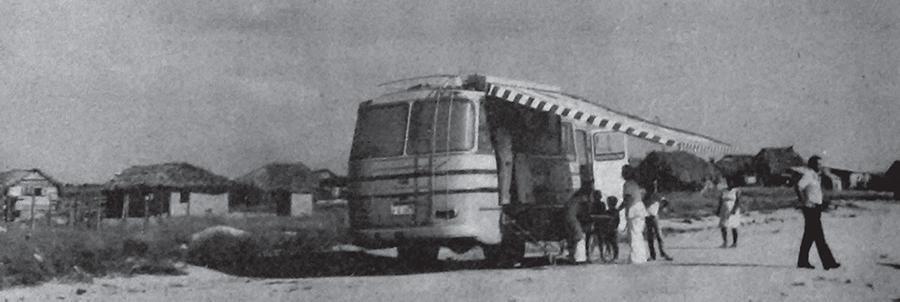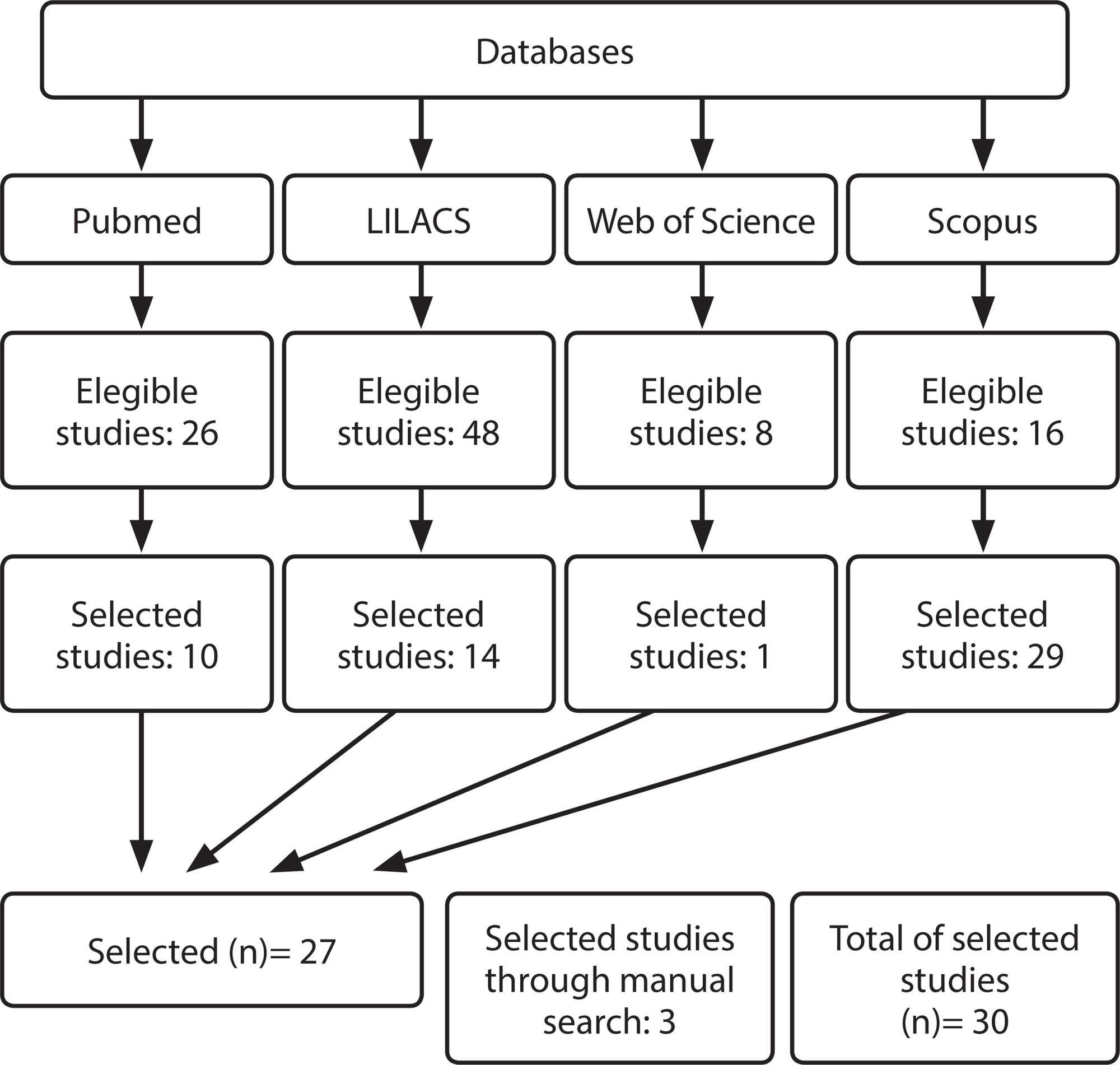-
ORIGINAL ARTICLE08-19-2019
Sociodemographic and health situation of teenage students according to sex
Revista Brasileira de Enfermagem. 2019;72(4):1007-1012
Abstract
ORIGINAL ARTICLESociodemographic and health situation of teenage students according to sex
Revista Brasileira de Enfermagem. 2019;72(4):1007-1012
DOI 10.1590/0034-7167-2018-0725
Views0See moreABSTRACT
Objective:
To verify the association between sex (male and female) and sociodemographic, reproductive and sexual variables in teenagers and identify the highest rates of social and health issues among them.
Method:
This was a cross-sectional study conducted with 239 adolescents enrolled in a public school of Salvador, Bahia, Brazil, whose data were produced by applying a structured form processed in Stata.
Results:
The research indicated an association between females and higher education level (p = 0.02), living with both parents (p = 0.02) and a higher rate of mental, social and behavioral issues. Being a man was associated with sexual initiation (p = 0.00), which occurred before they turned 14 years old (p = 0.05).
Conclusion:
The study variables behave, depending on sex, with smaller or greater chances of experiencing harmful situations, this understanding being essential for subsidizing educational activities that promote the quality of life of teenagers.
-
ORIGINAL ARTICLE08-19-2019
Indigenous health and nursing in Roraima in the 1970s
Revista Brasileira de Enfermagem. 2019;72(4):848-853
Abstract
ORIGINAL ARTICLEIndigenous health and nursing in Roraima in the 1970s
Revista Brasileira de Enfermagem. 2019;72(4):848-853
DOI 10.1590/0034-7167-2017-0791
Views0See moreABSTRACT
Objective:
To analyze the strategies undertaken by the government to address the health problem in Boa Vista/Roraima.
Method:
A study using the microhistory approach, with documentary sources from journalistic material of the 1970s through the triangulation technique: texts, images and context, with analysis from the perspective of the Social World Theory.
Results:
It was evidenced that the strategies undertaken by the government occurred in favor of the exploration of isolated areas in Roraima that demanded settlement processes, construction of villages and a highway to enable the interconnection of the state with other regions of Brazil, with a smoke screen symbolic effect produced by nurses on indigenous health.
Conclusion:
There was governmental manipulation, when the symbolic power was unveiled, making it possible to see and believe that nursing needs to guide political issues rather than being ruled.

-
Lawsuits in health: an integrative review
Revista Brasileira de Enfermagem. 2019;72(3):809-817
Abstract
Lawsuits in health: an integrative review
Revista Brasileira de Enfermagem. 2019;72(3):809-817
DOI 10.1590/0034-7167-2018-0551
Views0See moreABSTRACT
Objective:
To analyze the national and international scientific evidence available in the literature on types of judicialization of health lawsuits.
Method:
Integrative review, which selected primary studies in the PubMed, LILACS, Web of Science and Scopus databases, with the
Descriptors:
judicial decisions, health’s judicialization, Saúde (in Portuguese), Health, and the keyword: Judicial Action.
Results:
30 studies were selected. In Brazil, the majority were legal claims for medicines and the other for medical errors, requests for vaccines, supplies for diabetics, food compounds, surgical procedure, examinations, among others. In international studies, lawsuits were found for medication, benefit coverage and hospitalization for psychiatric treatment.
Conclusion:
It is evident that the most demanded type of lawsuit was access to the medication at an international level. It is still more noticeable the little discussion on this subject, demonstrating that judicialization of medicines can indicate a reality of Brazil.

-
ORIGINAL ARTICLE02-01-2019
Interactionist view of circumstances that interfere with nurses’ lifestyle
Revista Brasileira de Enfermagem. 2019;72:74-79
Abstract
ORIGINAL ARTICLEInteractionist view of circumstances that interfere with nurses’ lifestyle
Revista Brasileira de Enfermagem. 2019;72:74-79
DOI 10.1590/0034-7167-2017-0062
Views0See moreABSTRACT
Objective:
To analyze the circumstances interfering with nurses' lifestyle.
Method:
Qualitative study in light of the premises of the Grounded Theory and with theoretical reference of the Symbolic Interactionism. The study was conducted with 20 nurses from the municipality of Pinheiral, state of Rio de Janeiro.
Results:
The interference of work in nurses' lifestyle was unanimous and expressed by the union of the following subcategories: blaming work for sedentary habits; recording the lack of time; justifying physical/mental fatigue by the lack of healthy habits; emphasizing the financial situation; and exchanging self-care for the care of the other.
Final considerations:
The results showed nurses' complex life, as well as new possibilities for conducting daily choices. The need for actions that reduce the impact of workdays and contribute to these professionals incorporating a better lifestyle is noteworthy.
-
ORIGINAL ARTICLE02-01-2019
Moral sensitivity components identified among nurses from Intensive Care Units
Revista Brasileira de Enfermagem. 2019;72:2-8
Abstract
ORIGINAL ARTICLEMoral sensitivity components identified among nurses from Intensive Care Units
Revista Brasileira de Enfermagem. 2019;72:2-8
DOI 10.1590/0034-7167-2017-0202
Views0See moreABSTRACT
Objective:
to identify ethical problems from the components of moral sensitivity among nurses of Intensive Care Units.
Method:
qualitative, exploratory-descriptive study developed in a hospital in the South of Brazil with 19 nurses working in intensive care units through semi-structured interviews that were analyzed through discursive textual analysis.
Results:
ethical education, dialogue, relationships with other health team members, professional autonomy, knowledge, personal values, effective communication, leadership and patients' positive outcomes were identified as important components of nurses' moral sensitivity, and comprise the domains of moral consciousness, benevolent motivation, and spontaneous moral perception.
Final considerations:
the components of moral sensitivity identified in this study facilitate nurses' instrumentalization in the face of decision making and ethical problems in the intensive care setting.
-
RESEARCH01-01-2018
Mental health as a dimension for the care of teenagers
Revista Brasileira de Enfermagem. 2018;71:2087-2093
Abstract
RESEARCHMental health as a dimension for the care of teenagers
Revista Brasileira de Enfermagem. 2018;71:2087-2093
DOI 10.1590/0034-7167-2016-0192
Views0See moreABSTRACT
Objective:
To analyze the demands in the field of mental health from the perspective of teenagers.
Method:
A descriptive study with a qualitative approach, having comprehensiveness as an analytical category. It was carried out with 21 teenagers of both genders, students of two public schools of a municipality of the countryside of Bahia state. The empirical material was produced through reflection workshops and analyzed through the technique of Discourse Analysis.
Results:
Teenagers value the indissociability between body and mind, recognize lack of attention to the psychological dimension in the health network, and point to mental disorders as resulting from contexts of life and lack of Health Care.
Conclusion:
Health services need to be structured to attract teenagers, to recognize singularities through professionals trained in welcoming, listening and accountability. It is urgent to fulfill what is defined in public policies and in specific programs, and that comprehensiveness has a centrality as a perspective to be realized.
-
RESEARCH01-01-2018
Teaching of infection control in undergraduate courses in health sciences: opinion of experts
Revista Brasileira de Enfermagem. 2018;71:1626-1634
Abstract
RESEARCHTeaching of infection control in undergraduate courses in health sciences: opinion of experts
Revista Brasileira de Enfermagem. 2018;71:1626-1634
DOI 10.1590/0034-7167-2017-0928
Views0See moreABSTRACT
Objective:
To know the perception of expert professionals in infection control and prevention on the teaching of skills for the prevention and control of infections related to health care in undergraduate courses in Health Sciences.
Method:
We used the Delphi technique, developed in four sequential rounds. Thirty-one nurses and eight physicians participated in the study. Qualitative data were analyzed through content analysis; the quantitative ones, from the descriptive statistics.
Results:
The importance of the courses has had teachers with expertise in infection control and prevention added to arguments about the development of the subject in the curricula by means of a specific subject or as a transversal theme.
Conclusions:
In order to cover the complexity of the elements that are interconnected for professional training, teaching must be based on pedagogical strategies that provoke reflection in students, encouraging them to develop critical thinking about their experiences.
-
RESEARCH01-01-2018
Scientific production of the International Classification for Nursing Practice: a bibliometric study
Revista Brasileira de Enfermagem. 2018;71(6):2860-2868
Abstract
RESEARCHScientific production of the International Classification for Nursing Practice: a bibliometric study
Revista Brasileira de Enfermagem. 2018;71(6):2860-2868
DOI 10.1590/0034-7167-2017-0411
Views0See moreABSTRACT
Objective:
To describe the scientific production of the International Classification for Nursing Practice throughout dissertations and theses published by nurses in Brazil from 1996 to 2016.
Method:
A bibliometric, descriptive, quantitative documentary study, carried out from October/2015 to July/2016 on the sites of the Center of Studies and Research in Nursing (CEPEn), at the thesis and dissertation banks of the Coordination of Improvement of Higher Education Personnel and of the Plataforma Sucupira (Sucupira Platform).
Results:
There were 108 productions, 30 theses and 78 dissertations. In 2014, there was the largest number of publications (19). The Graduate Program in Nursing of the Universidade Federal da Paraíba had the highest number of productions (23). Regarding the theme, the use in clinical practice was highlighted (69), followed by the elaboration of terminology subsets (17).
Conclusion:
The Brazilian scientific production setting on ICNP® is expressive, evidencing this system as a tool that allows the provision of systematic care.




